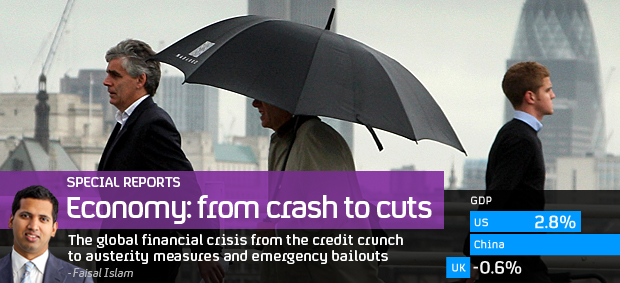Bailout or default for debt-laden Greece?
As the leaders of Germany and France call for a new bailout for Greece, we examine the available options – from financial support and austerity measures to the nuclear option of a debt default.

Why this new Greek debt crisis?
In May 2010 the country’s burgeoning budget deficit meant Greece was in danger of defaulting on its debt.
In return for a bailout package from the IMF and eurozone members, worth 110bn euros, the Greek Government agreed to a new package of austerity measures, which included big reductions in public sector salaries, a severe cut in pensions, and a large hike in the retirement age.
But the austerity package has hit growth, unemployment in Greece is up, and the national debt now stands at 330bn euros.
What is more, earlier this week Standard and Poor’s lowered its rating for Greece’s creditworthiness to CCC, making Greek debt the lowest in the world. As of Thursday, yields on two-year Greek bonds had surged to 29.2 per cent – a euro-era high.
What is on offer for Greece this time round?
The new rescue plan is expected to amount to 125bn euros. That money will come in part from the European Union and the International Monetary Fund, and in part from the proceeds of the privatisation of Greek assets. In addition, private investors currently holding Greek debt could be expected to “roll over” when it expires – and buy new debt.
It potentially pits the IMF and the European Central Bank (ECB) – both of which are resistant to entering into any arrangement that could be construed as a default – against Germany, which wants to force losses on private debt holders. If Germany has its way, the cost of the rescue plan could be reduced to around 90bn euros.
But Sylvia Ardagna, senior economist with Bank of America Merrill Lynch, is cautiously optimistic about Greece’s prospects. “If Greece does all the reforms it has to, by 2014 it should have a substantial primary surplus of around 4 per cent of GDP. The debt will still be high – but clearly if growth comes back, the prospects will be much better than today.
“If the Europeans and the IMF provide enough funds for Greece not to have to go back to the markets tomorrow but give Greece enough time and enforce the necessary reforms, then by 2014 we might be in a better position than today.”
What if Greece chooses the nuclear option and defaults?
There is a domestic political dimension to events in Greece. The country’s prime minister, George Papandreou, is desperately trying to form a new government to pass a new set of austerity measures that would remove a further 28bn euros from the country’s budget by 2015.
But Graham Turner of GFC Economics is pessimistic about Greece’s prospects. “This is really down to the Greek people,” he told Channel 4 News. “There comes a point where people say enough’s enough. You can’t just keep going down the path of austerity when there’s no end in sight.
You can’t just keep going down the path of austerity when there’s no end in sight. Graham Turner, GFC Economics
“The last Bank of Greece report, published this week, shows the budget deficit is worse this year than it was in 2010 – so all the pain has been for absolutely nothing. That’s probably been the trigger for the latest upheaval: people are realising the futility of this kind of deflation.”
“At the end of the day, it comes down to whether or not you believe the debtors should take the pain. This is all about politics now. Will the Greek people accept the measures the IMF is demanding?
“My prognostication is very troubling. There’s no way Greece can pay back these debts. The kind of fiscal deflation it has suffered is just not sustainable.”
And the most likely scenario?
Germany hopes Prime Minister Papandreou can forge a government of national unity, which will then push through reforms and tide Greece through until the early autumn, when the final tranche of the first bailout package is due.
Sylvia Ardagna believes the EU also needs to provide a sizeable second aid package in order for Greece not to have to fund itself on the bond market until the end of 2014. “At the same time, the Greek government must enforce the required reforms.”
Graham Turner, however, says that will not happen. He predicts a Greek default will increase the pressure on Spain, Portugal, Ireland and Italy and make it likely other countries will default on their debt.
“People talk of contagion – but you don’t get contagion unless the fundamentals are wrong. A fire will spread through an area that’s been suffering drought.”
-
Latest news
-
‘Government responsiveness should be improved’ says infected blood inquiry chair4m

-
Infected Blood scandal: How UK failed on a global scale4m

-
‘There’s a strong evidential basis’ for ICC to grant arrest warrants for Netanyahu, says criminal law expert4m

-
International Criminal Court prosecutor seeks arrest warrants for Israel PM and Hamas leaders3m

-
‘Highly unlikely there was foul play’ in Iran president helicopter crash, says Tehran professor5m

-





